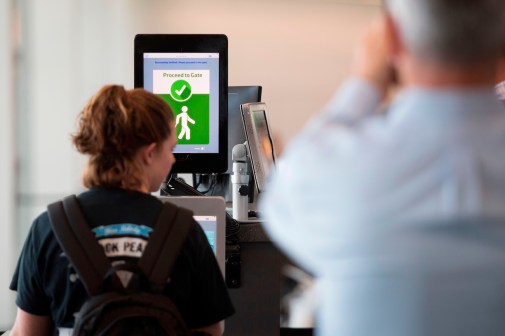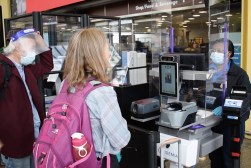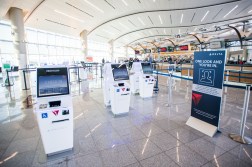LAX facial recognition pilot deemed successful, Lufthansa rolls out biometric gates

Lufthansa, Europe’s largest airline, launched a biometric boarding pilot program for its flights from Los Angeles International Airport (LAX) Monday. The airline hopes to expand the technology nationwide.
During an initial three-week trial period, which began at LAX earlier this month, nearly 350 passengers boarded an A380, the world’s largest passenger airliner, in about 20 minutes, according to a statement released by the airline. The technology behind the self-boarding gates is facial recognition.
Cameras on gates photograph each passenger as they approach, and the photo is sent to the U.S. Customs and Border Patrol (CBP) agency’s database. Once the passenger’s face is matched with their name, they are marked as boarded and no longer need to present a boarding pass or passport. The whole process is designed to be as simple as walking straight through the gate.
“The increasing need for airlines, airports and authorities to offer faster and more convenient processes for guests to move through the airport creates a unique opportunity for the use of biometrics,” said Bjoern Becker, senior director of product management and digital services for Lufthansa.
Lufthansa found a willing partner in CBP, which can ostensibly use the self-boarding gates to expand their database.
“CBP is excited to work with air travel industry partners like Lufthansa to demonstrate how facial biometrics can provide a range of traveler benefits for a secure and seamless passenger experience,” John Wagner, deputy executive assistant commissioner for CBP’s office of field operations, said in a statement.
The facial recognition technology used in the gates was developed by Lufthansa’s longstanding IT partner Amadeus, a major Spanish IT provider, and VisionBox, a provider of automated border control systems.
“Biometric boarding has enormous potential to make the travel experience easier and less stressful,” said Guido Haarmann, managing director of airlines for Amadeus. “Last year, over 1.6 billion passengers boarded planes using Amadeus Altéa technology.”
Should the pilot program at LAX continue to succeed, Lufthansa intends to expand the program, bringing it to airports across the United States and perhaps to other transportation hubs, like train stations.
“We anticipate that in near time, biometric boarding, as well as other aspects of the air travel experience, will be widely utilized across the U.S. and beyond,” said Becker.






